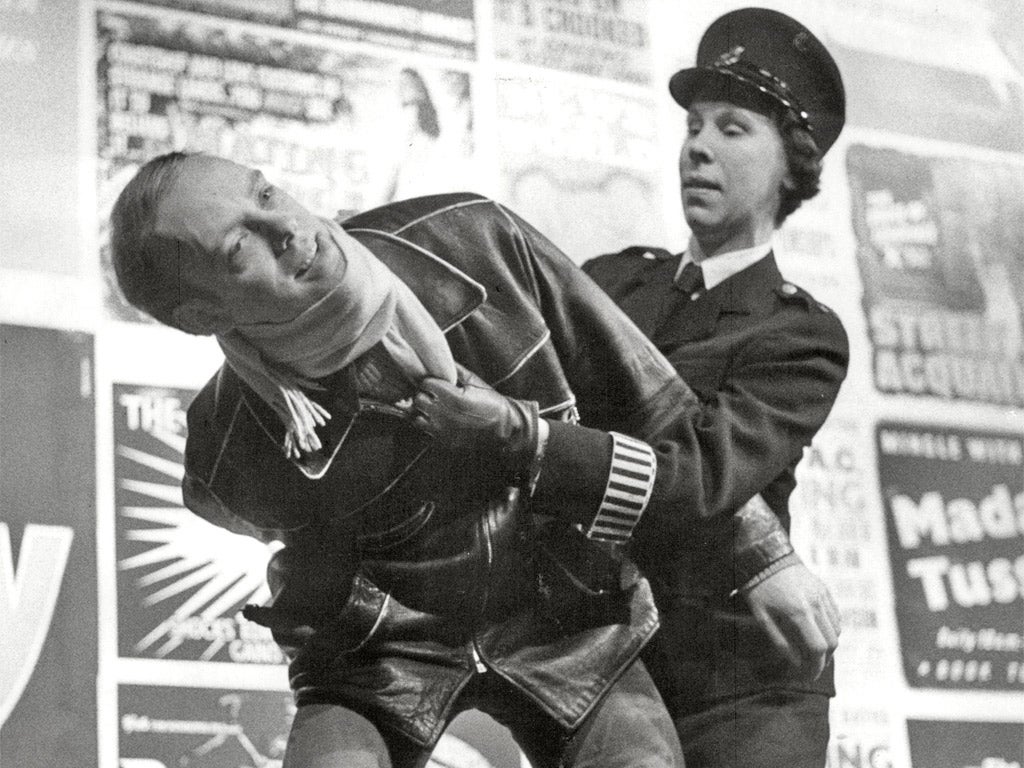Barbara Hicks: Veteran of stage and television who excelled in period dramas and worked with Olivier, Coward and Ayckbourn

Among those actors who never starred but always shone, Barbara Hicks is guaranteed a place. She was at the Royal Court during its ascendant years, and her time at the National Theatre would reflect its own first quarter of a century, from being directed by Laurence Olivier in The Crucible (1965) – for which she had the appropriate Puritan countenance – at the Old Vic, to performing on the South Bank stage named after him, in Alan Ayckbourn's A Small Family Business (1987).
Television roles, particularly in the BBC's Sunday early-evening classic serials and including rustics, status-proud servants and bourgeois ladies, further displayed her ability to be charmingly eccentric one minute, and glaringly intimidating the next. In real life, she was well-loved within the profession, with countless friends and a mischievous sense of humour.
She was born in Wolverhampton, where her father, an iron and steel merchant, was known as "Copper" Hicks, and educated at Adcote School for Girls. During the Second World War in Wales she was a land girl, something she played in one of her first TV dramas, No Other Verdict (ITV, 1955), before entering the Webber-Douglas School of Dramatic Art in 1945.
With three other Webber-Douglas graduates she enterprisingly staged Over To You, a showcase, or "revuette" as they termed it, at the school's performance space, the Chanticleer Theatre, in 1948, a year after her graduation. Later that year she made her West End debut when Written For A Lady, a Jewish family saga, transferred to the Garrick from the Royal Court, Liverpool.
As Mrs Titus Dudgeon she supported Tyrone Power in Shaw's The Devil's Disciple (Winter Garden, 1956), but her West End roles were generally comedies: Six Months' Grace (Phoenix, 1957), one of the final appearances of Yvonne Arnaud; The Tunnel Of Love, which ran for over a year after opening at Her Majesty's in December 1957; and Miss Pell Is Missing (Criterion, 1962), set in 1915 Manhattan, with an unlikely pair of Americans in Wilfrid Hyde- White and Richard Briers.
Her association with the English Stage Company at the Royal Court began in 1959, with a Sunday evening of "Jazzetry" directed by Lindsay Anderson, that combined jazz music with poetry and a "newsplay" by Christopher Logue, The Trial Of Cob And Leach, featuring Hicks as a meddler called Peaches. Befriending the famously uncompromising Anderson, she worked for him and Logue in The Lily White Boys (1960), a musical with Albert Finney as a juvenile delinquent. Hicks, who never claimed any musical talents, had multiple roles as female Upright Citizens; a Royal Court staff member told her years later that "your singing still hasn't left the rafters."
Having appeared in Noel Coward's Feydeau adaptation Look After Lulu (Royal Court, 1959), starring Vivien Leigh, she was then directed by him in the National's revival of Hay Fever in 1964. She always retained fond memories of playing the housekeeper and former dresser Clara in what Coward termed "a cast that could play the Albanian telephone directory", and would work again with Maggie Smith, Derek Jacobi, Robert Stephens and Lynn Redgrave. Maintaining a lasting friendship with Redgrave, she was in fine form as a guest on her This Is Your Life in 1996.
Her Dickensian television period began as the vinegary maid Miss Miggs in Barnaby Rudge (1960) and Oliver Twist (1962), as the undertaker Sowerberry's wife; by contrast, she was a foil to the pseudo-elderly slapstick comic Richard Hearne in Ask Mr Pastry (BBC, 1961). She played the drunken cook to David (Ian McKellen) and Dora in David Copperfield (1966), and for producer Barry Letts, did Eliot's The Mill On The Floss (1979) and Dombey And Son (1983).
Remaining at the National, she was well cast as a theatrical landlady in Trelawny Of The 'Wells' (1966), again with Smith and Jacobi, and Jill Bennett, who became Giles' godmother. Following the end of her first marriage, to a stage manager, in 1970 she married Lieutenant-Colonel Peter Taylor, who was awarded the Military Cross twice during the Second World War, and was away from acting for almost a decade when they moved to the island of Elba.
One of her favourite roles in any medium was in Terry Gilliam's Brazil (1985), gleefully grotesque as a plastic surgery addict; her son Giles recalls that she loved working with Gilliam, who "pandered to her every whim".
In Ayckbourn's staging of Tons Of Money in 1986, and his own A Small Family Business, Hicks appeared alongside Michael Gambon – who had been a secondary player, billed as Mike – in The Crucible, Mother Courage And Her Children, and Love For Love with her, over 20 years earlier.
Her last play, for the National, was Rodney Ackland's Absolute Hell in 1995, alongside another friend, Judi Dench; both had done the BBC's television version four years earlier. Sally Potter's Orlando (1992) also featured her son Giles, like her a seasoned player, and the made-for-television Memento Mori (BBC, 1991), directed by Jack Clayton, and Up At The Villa (2000) had her in splendid ensembles, containing many of her friends.
Although she never worked for Alan Bennett on stage, her roles in his semi-autobiographical Me! I'm Afraid Of Virginia Woolf (LWT, 1978), and A Question Of Attribution (BBC, 1991), led him to observe: "When you go, Barbara, there'll be a terrible hole in Spotlight".
Gavin Gaughan
Barbara Hicks, actress: born Wolverhampton 12 August 1924; married 1951 Robert Loblowitz (divorced 1961), 1970 Lt-Col Peter Taylor (died 2010; one son); died Essex 6 September 2013.
Join our commenting forum
Join thought-provoking conversations, follow other Independent readers and see their replies
Comments
Bookmark popover
Removed from bookmarks